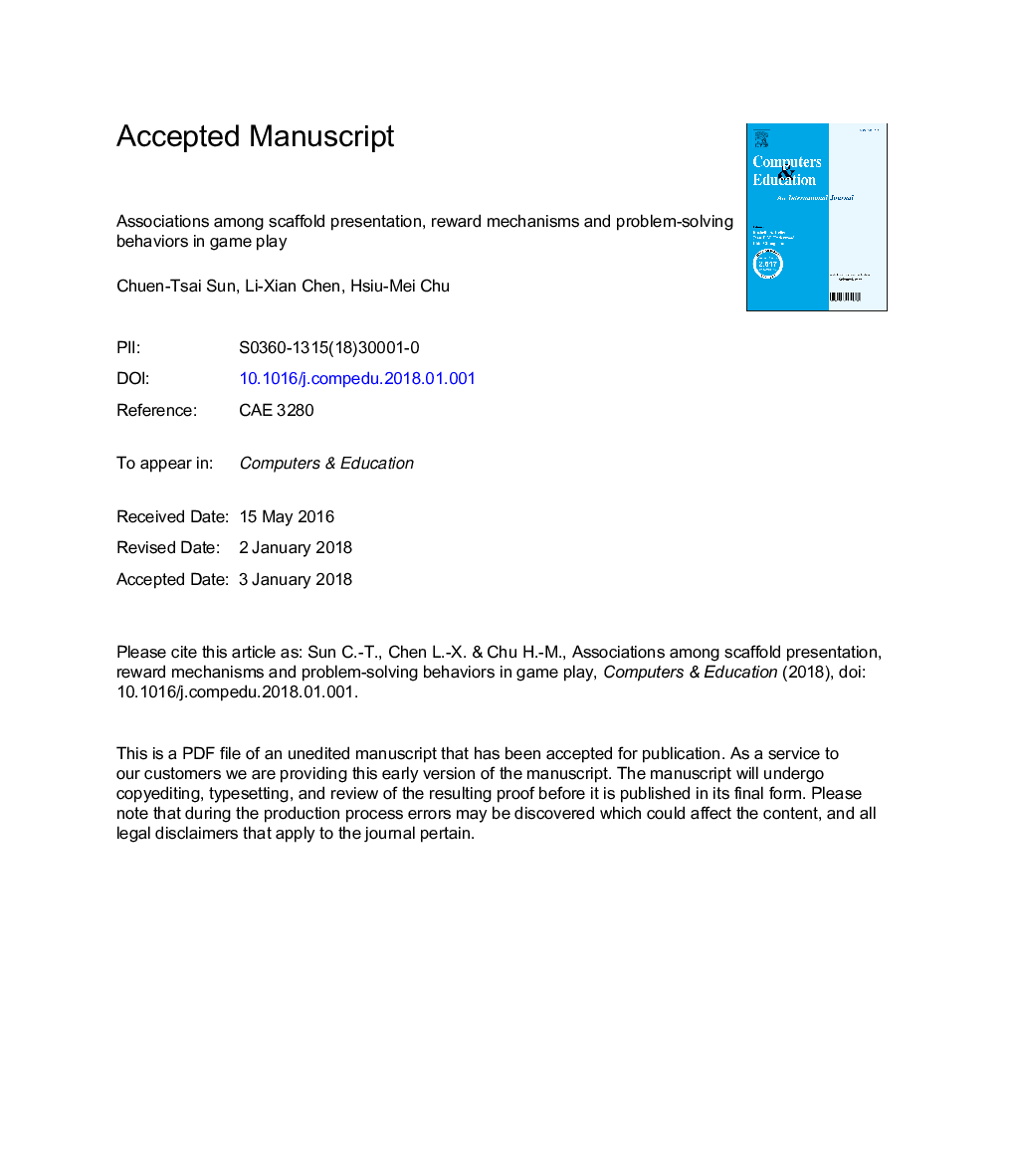| کد مقاله | کد نشریه | سال انتشار | مقاله انگلیسی | نسخه تمام متن |
|---|---|---|---|---|
| 6834788 | 1434529 | 2018 | 72 صفحه PDF | دانلود رایگان |
عنوان انگلیسی مقاله ISI
Associations among scaffold presentation, reward mechanisms and problem-solving behaviors in game play
ترجمه فارسی عنوان
انجمن در میان ارائه داربست، مکانیسم پاداش و رفتارهای حل مسئله در بازی
دانلود مقاله + سفارش ترجمه
دانلود مقاله ISI انگلیسی
رایگان برای ایرانیان
کلمات کلیدی
رابط انسان و کامپیوتر، محیط یادگیری تعاملی، رسانه در آموزش و پرورش، استراتژی های آموزشی / یادگیری،
ترجمه چکیده
ابزارهای یادگیری استفاده شده با بازی های دیجیتال - معمولا داربست نامیده می شود - می تواند سرخوردگی بازیکنان را کاهش دهد و به آنها در ایجاد موفقیت آمیز کمک کند تا راه حل های حل مسئله را ایجاد کنند. اعتقاد بر این است که مکانیسم های پاداش در قالب انگیزه های خارجی به تقویت انگیزه و ترویج یادگیری کمک می کند، اما احتمالا به هزینه اعتماد فراگیر یادگیرنده. برخی از محققان پیشنهاد کرده اند که مکانیسم پاداش می تواند برای جلوگیری از تبدیل بازیکنان به داربست ها مورد استفاده قرار گیرد. برای این مطالعه، پروفسور سودوکو، یک نسخه ساده از بازی استدلال دیجیتالی دلخواه، برای بررسی اثرات مکانیسم ارائه پاداش به جای پاداش در رفتارهای حل مسئله و اقدامات با هدف تطبیق، سفارشی کردیم. در مجموع 126 نفر شرکت کننده به داربست فعال (کمک مستقیم به بازیکنان در ابتدای یک بازی)، داربست منفعل (که توسط سیستم بازی انجام می شود زمانی که بازیکنان در مدت زمان مشخصی سه اشتباه را انجام دادند) و گروه های داربست پنهان (قابل دسترسی هروقت). هر داربست سه عملکرد داشت: نشانه گذاری ویژگی های بحرانی، کنترل نا امیدی و تظاهرات. سه گروه مکانیسم پاداش به دست آوردن نقطه و به دست آوردن امتیاز امتیاز داده شد. داده های ما نشان می دهد که ارائه مناسب یک یا چند داربست باعث کاهش وابستگی بازیکنان به حمایت و افزایش توانایی های یادگیری مثبت و کاهش ناامیدی می شود. نتایج نشان می دهد که مکانیسم پاداش به جای اعتماد به داربست ها، حل مسائل مستقل را ارتقا داد و افزود که مکانیسم های داربست و پاداش، بازیکنان با تجربه را برای ایجاد قوانین جدید، غلبه بر محدودیت های قوانین موجود و ایجاد راهکارهای پیچیده تر یادگیری تشویق کردند. ما در مورد نیاز به دقت طراحی ارائه داربست با توجه به اهداف آموزشی خاص و همچنین مزایای احتمالی برای معلمان از نظر تحلیل مشکلات دانشجویان فردی در حل مسائل عددی مواجه هستیم.
موضوعات مرتبط
علوم انسانی و اجتماعی
علوم اجتماعی
آموزش
چکیده انگلیسی
Learning assistance tools used with digital games-commonly called scaffolds-can reduce player frustration and help them create problem-solving strategies while supporting achievement. Reward mechanisms in the form of external incentives are also believed to enhance motivation and promote learning, but possibly at the expense of excessive learner reliance. Some researchers have suggested that reward mechanisms can be used to discourage players from becoming dependent on scaffolds. For this study we customized Professor Sudoku, a simplified version of the popular digital reasoning game, to investigate the effects of scaffold presentation-plus-reward mechanism on problem-solving behaviors and actions aimed at leveling-up. A total of 126 participants were divided into active scaffold (providing direct assistance to players at the beginning of a game), passive scaffold (provided by the game system when players made three mistakes within a specified time frame), and hidden scaffold groups (accessible at any time). Each scaffold served three functions: critical feature marking, frustration control, and demonstration. The three groups were given point-gain and point-loss reward mechanisms. Our data indicate that the appropriate presentation of one or more scaffolds reduced player reliance on support, thereby increasing the potential for positive learning effects and reducing frustration. Results suggest that the reward mechanism promoted independent problem solving instead of reliance on scaffolds, and that the addition of scaffolds and reward mechanisms encouraged experienced players to create new rules, overcome the limitations of existing rules, and develop more complex learning strategies. We discuss the need to carefully design scaffold presentation type according to specific instructional purposes, and possible benefits for teachers in terms of analyzing the difficulties that individual students face when solving numerical problems.
ناشر
Database: Elsevier - ScienceDirect (ساینس دایرکت)
Journal: Computers & Education - Volume 119, April 2018, Pages 95-111
Journal: Computers & Education - Volume 119, April 2018, Pages 95-111
نویسندگان
Chuen-Tsai Sun, Li-Xian Chen, Hsiu-Mei Chu,
